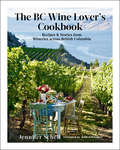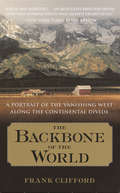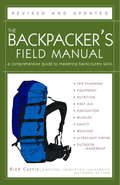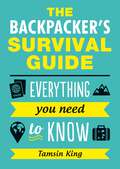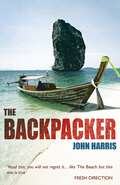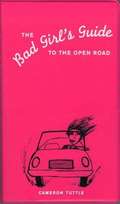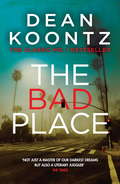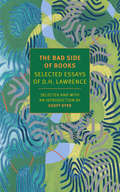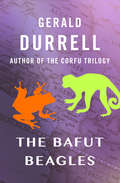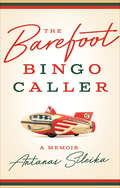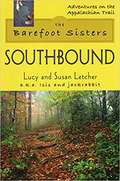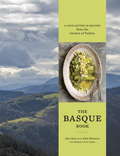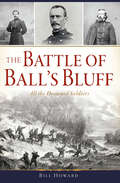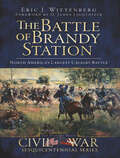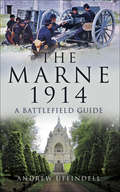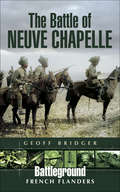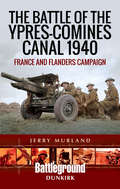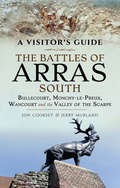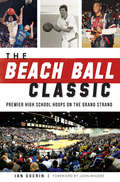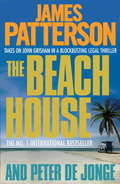- Table View
- List View
The BC Wine Lover's Cookbook: Recipes & Stories from Wineries Across British Columbia
by Jennifer SchellDiscover the vineyards, valleys, islands, deserts--and kitchens--of BC's Wine Country in this collection of recipes, tour ideas, menus and more. Take a tour through beautiful British Columbia with award-winning cookbook author and winemaker Jennifer Schell. The BC Wine Lover's Cookbook shares family stories and recipes from 53 top wineries located across the province--from the verdant, rolling fields of the Okanagan and Fraser Valley, to the misty coastlines of Vancouver Island, and beyond. Meet the winemakers of BC wine country and take a seat at their table to share dishes that evoke the multicultural heritage of BC's wine industry. From tourtière to turkey moussaka and Michelle's Panna Cotta to Nana's Roast Caribou, these recipes have been lovingly handed down through the generations--on handwritten recipe cards, on creased and spattered pages, sometimes by word of mouth. And don't forget the wine! Each recipe is accompanied by a pairing suggestion from the winery's cellars. Whether you are perched on Naramata Bench or tucked up at home, this is a cookbook to read and to inspire.
The Backbone of the World: A Portrait of the Vanishing West Along the Continental Divide
by Frank CliffordIn recent years, Los Angeles Times writer and editor Frank Clifford has journeyed along the Continental Divide, the hemispheric watershed that spans North America from the alkali badlands of southernmost New Mexico to the roof of the Rockies in Montana and into Canada. The result is The Backbone of the World, an arresting exploration of America's longest wilderness corridor, a harsh and unforgiving region inhabited by men and women whose way of life is as imperiled as the neighboring wildlife. With the brutal beauty and stark cadences of a Cormac McCarthy novel, The Backbone of the World tells the story of the last remnants of the Old West, America's mythic landscape, where past and present are barely discernible from one another and where people's lives are still intrinsically linked to their natural surroundings. Clifford vividly captures the challenges of life along the Divide today through portraits of memorable characters: a ranching family whose isolated New Mexico homestead has become a mecca for illegal immigrants and drug smugglers; a sheep herder struggling to make a living tending his flock in the mountains above Vail, Colorado: an old mule packer who has spent years scouring the mountains of northwest Wyoming for the downed plane of his son; a Yellowstone Park ranger on a lone crusade to protect elk and grizzly bears from illegal hunters; and a group of Blackfeet Indians in northern Montana who are fearful that a wilderness sanctuary will be lost to oil and gas development. In each of their stories, the tide of change is looming as environmental, economic, social, and political forces threaten this uniquely unfettered population. Clifford's participatory approach offers a haunting and immediate evocation of character and geography and an unsentimental eulogy to the people whose disappearance will sever a link with the defining American pioneer spirit. Set in a world of isolated ranches, trail camps, mountain bivouacs, and forgotten hamlets, The Backbone of the World highlights the frontier values that have both ennobled and degraded us, values that symbolize the last breath of our founding character. From the Hardcover edition.
The Backpacker's Field Manual, Revised and Updated
by Rick CurtisThe Backpacker's Field Manual has been the bible of the Princeton University Outdoor Action Program for more than a decade, field-tested by one of the most respected outdoor programs in the country. It is the most comprehensive backpacking guide available--broad in scope while still focused on the essential skills and information that backpackers need to travel safely and comfortably in the wilderness. Backpackers of all levels will find this book indispensable: before you start your trip, for deciding on an itinerary, selecting equipment, and figuring out what food, clothing, and other supplies to pack; once you're out in the wilderness, for choosing a campsite, setting up camp, navigating with map and compass, identifying trees and plants, and preparing meals (recipes included!); if something unexpected happens, for finding a lost person, seeking shelter in a lightning storm, and performing first aid for common injuries. More than 100 line drawings illustrate such useful skills as how to set up a tarp, repair your stove, wrap an injured ankle, predict the weather, and much more. And scattered throughout are Tricks of the Trail, additional tips for successful backcountry hiking. Any traveler knows that space in a backpack is limited, so on your next trip, pack the only guide you'll need--this one.
The Backpacker's Field Manual, Revised and Updated: A Comprehensive Guide to Mastering Backcountry Skills
by Rick CurtisWhen it was first published in 1998, The Backpacker's Field Manual set the standard for comprehensive backpacking books. Now exhaustively updated to offer a more complete view of backpacking today, it covers the latest developments in gear--such as Global Positioning Systems and ultralight hiking equipment--first aid, and Leave No Trace comping, and includes a chapter devoted to outdoor leadership resources and basics. Beginners and experienced hikers alike will find this book indispensable for trip planning strategies and also as a quick reference on the trail for:BACKCOUNTRY SKILLS--how to forecast the weather, identify trees, bear-proof your campsite, wrap an injured ankle, and more--illustrated with more than 100 line drawings.TRICKS OF THE TRAIL--time-tested practical lessons learned along the wayGOING ULTRALIGHT--downsizing suggestions for those who want to lighten upEvery traveler knows that space in a backpack is limited, so on your next trip, carry the only guide you'll ever need--this one--and take to the great outdoors with confidence.
The Backpacker's Survival Guide: Everything You Need to Know
by Tamsin KingA big trip brings big questions, like how do I go about choosing and packing a bag, how should I handle money abroad, and what the hell do I do when my hostel dorm is filled with snorers? Luckily this handy guide is filled with essential tips, advice and hacks to make your adventures on the road truly unforgettable.
The Backpacker's Survival Guide: Everything You Need to Know
by Tamsin KingA big trip brings big questions, like how do I go about choosing and packing a bag, how should I handle money abroad, and what the hell do I do when my hostel dorm is filled with snorers? Luckily this handy guide is filled with essential tips, advice and hacks to make your adventures on the road truly unforgettable.
The Backpacker: The True Story of Wild Adventures and Even Wilder Parties in South-East Asia - A Travel Classic
by John HarrisJohn’s trip to India starts badly when he finds himself looking at the sharp end of a knife in a train station cubicle. His life is saved by Rick, who persuades John to abandon his plans and travel to the Thai island of Koh Pha-Ngan where they pose as millionaire aristocrats. Pursued by Thai Mafia, they escape, facing danger at every turn.
The Backpacker: The True Story of Wild Adventures and Even Wilder Parties in South-East Asia - A Travel Classic
by John HarrisJohn’s trip to India starts badly when he finds himself looking at the sharp end of a knife in a train station cubicle. His life is saved by Rick, who persuades John to abandon his plans and travel to the Thai island of Koh Pha-Ngan where they pose as millionaire aristocrats. Pursued by Thai Mafia, they escape, facing danger at every turn.
The Bad Girl's Guide to the Open Road
by Cameron Tuttle Susannah BettagFrom the author of the very funny and successful Paranoid's Pocket Guide comes the ultimate self-help book for women. It is a guide to the open road that is strictly AAA -- that's attitude, adventure, and ass-kicking good times. Filled with indispensable information such as how to get out of a speeding ticket without crying and 14 ways to open a beer bottle on your car, The Bad Girl's Guide to the Open Road also gives the practical lowdown on what to do when your engine overheats, you get a flat, or you need a safe and legal place to spend the night in your car. The fabulous pocket format and indestructible cover make it perfect for flinging in the glove compartment (or stashing in your cubicle if you can't leave right away). For every woman who is about to break unless she gets a break, this hilarious book is the antidote to the doldrums whether work-, man-, or self-induced. The Bad Girl's Guide to the Open Road: because sometimes a girl's just gotta go.
The Bad Place: A gripping horror novel of spine-chilling suspense
by Dean KoontzHe has blood on his hands... Dean Koontz's The Bad Place is a terrifying novel that will chill the blood even as it rends the heart. Perfect for fans of Stephen King and Harlan Coben.'This is white-knuckle, hair-curling-on-the-back-of-the-neck reading - as close to actual physical terror as the printed word can deliver' - Los Angeles Times Frank Pollard awakens in an alley, knowing nothing but his name and that he is in danger. Over the next few days he develops a fear of sleep because when he wakes he finds blood on his hands, and bizarre and terrifying objects in his pockets. Distraught and desperate, Frank begs husband-and-wife detective team Bobby and Julie Dakota to get to the bottom of his mysterious, amnesiac fugues. It seems a simple job, but they are drawn into ever-darkening realms where they encounter the nightmarish, hate-filled figure stalking Frank. And their lives are threatened, as is that of Julie's gentle, Down's-syndrome brother, Thomas.To Thomas, death is the 'bad place' from which there is no return. But as each of them ultimately learns, there are equally bad places in the world of the living, places so steeped in evil that, in contrast, death seems almost to be a relief... What readers are saying about The Bad Place: 'This is truly a horror novel worthy of the name... shocking, distressing, gloriously well-plotted''If you want something truly original, yet gripping and fast-paced, DK is your man''One of the best books I have ever read!'
The Bad Side of Books: Selected Essays of D.H. Lawrence
by D.H. LawrenceYou could describe D.H. Lawrence as the great multi-instrumentalist among the great writers of the twentieth century. He was a brilliant, endlessly controversial novelist who transformed, for better and for worse, the way we write about sex and emotions; he was a wonderful poet; he was an essayist of burning curiosity, expansive lyricism, odd humor, and radical intelligence, equaled, perhaps, only by Virginia Woolf. Here Geoff Dyer, one of the finest essayists of our day, draws on the whole range of Lawrence&’s published essays to reintroduce him to a new generation of readers for whom the essay has become an important genre. We get Lawrence the book reviewer, writing about Death in Venice and welcoming Ernest Hemingway; Lawrence the travel writer, in Mexico and New Mexico and Italy; Lawrence the memoirist, depicting his strange sometime-friend Maurice Magnus; Lawrence the restless inquirer into the possibilities of the novel, writing about the novel and morality and addressing the question of why the novel matters; and, finally, the Lawrence who meditates on birdsong or the death of a porcupine in the Rocky Mountains. Dyer&’s selection of Lawrence&’s essays is a wonderful introduction to a fundamental, dazzling writer.
The Bafut Beagles
by Gerald DurrellTravel to the wilds of Cameroon with the conservationist whose work inspired Masterpiece production The Durrells in Corfu on public television. In 1949, Gerald Durrell embarks with fellow zoologist Kenneth Smith on an expedition to collect rare animals in the British Cameroons in West Central Africa. There, he meets the Nero-like local ruler, the Fon of Bafut, who likes a man who can hold his liquor—will Durrell be able to get on his good side? In this unique memoir, set off on a journey with the famed British naturalist&’s group of hunters and his pack of motley hunting dogs as they encounter an array of exotic creatures, including flying mice, booming squirrels, a frog with a mysterious coat of hair, and teacup-size monkeys; and witness the joys and problems of collecting, keeping, and transporting wild animals from Africa to England. This ebook features an illustrated biography of Gerald Durrell including rare photos from the author&’s estate.
The Ball: Discovering the Object of the Game
by John FoxAnthropologist John Fox sets off on a worldwide adventure to thefarthest reaches of the globe and the deepest recesses of our ancientpast to answer a question inspired by his sports-loving son: "Why do we play ball?"From Mexican jungles to the small-town gridirons of Ohio, frommedieval villages and royal courts to modern soccer pitches andbaseball parks, The Ball explores the little-known origins ofour favorite sports across the centuries, and traces how a simpleinvention like the ball has come to stake an unrivaled claim on ourpassions, our money, and our lives. Equal parts history and travelogue,The Ball removes us from the scandals and commercialism of today'ssports world to uncover the true reasons we play ball, helping us reclaimour universal connection to the games we love.
The Barefoot Bingo Caller: A Memoir
by Antanas SileikaWitty, wide-ranging stories of one man’s adventures in the world: “Filled with pleasures . . . I enjoyed it immensely” (Meg Wolitzer, New York Times–bestselling author of The Interestings). In The Barefoot Bingo Caller, Antanas Sileika finds what’s funny and touching in the most unlikely places, from a bingo hall to the collapsing Soviet Union. He shares stories of his attempts to shake off his suburban, ethnic, folk-dancing childhood; his divided allegiance as a Lithuanian-Canadian father; and such memorable characters as aging beat poets, oblivious college students, and an obdurate porcupine. Passing through places as varied as a prime minister’s office and the streets of Paris, these wry and moving dispatches on work, family, art, and identity are masterpieces of comic memoir and social observation. “The memories have been vividly, deliberately shaped by a master storyteller over a lifetime of telling, to powerful and often hilarious effect.” —Quill & Quire (starred review) “Funny and wistful, always engaging and wholly original, The Barefoot Bingo Caller charts the geography of belonging from the suburbs of Weston to the streets of Vilnius, from iconic Parisian bookstores to secret fishing holes in the backwoods of Ontario.” —Will Ferguson, Giller Prize–winning author
The Barefoot Sisters Southbound (Adventures On The Appalachian Trail)
by Lucy Letcher Susan LetcherAt the ages of twenty-five and twenty-one, Lucy and Susan Letcher set out to accomplish what thousands of people attempt each year: thru-hike the entire 2,175 miles of the Appalachian Trail. The difference between them and the others? They decided to hike the trail barefoot. Quickly earning themselves the moniker of the Barefoot Sisters, the two begin their journey at Mount Katahdin and spend eight months making their way to Springer Mountain in Georgia. As they hike, they write about their adventures through the 100-mile Wilderness, the rocky terrain of Pennsylvania, and snowfall in the Great Smoky Mountains--a story filled with humor and determination. It's as close as one can get to hiking the Appalachian Trail without strapping on a pack.
The Basque Book: A Love Letter in Recipes from the Kitchen of Txikito
by Alexandra Raij Rebecca Flint Marx Eder MonteroWhether it's a perfectly ripe summer tomato served with just a few slivers of onion and a drizzle of olive oil, salt cod slowly poached in oil and topped with an emulsion of its own juices, or a handful of braised leeks scattered with chopped egg, Basque cooking is about celebrating humble ingredients by cooking them to exquisite perfection.Chefs Alexandra Raij and Eder Montero are masters of this art form, and their New York City restaurant Txikito is renowned for its revelatory preparations of simple ingredients. In this much-anticipated and deeply personal debut, Raij and Montero share more than one hundred recipes from Txikito--all inspired by the home cooking traditions of the Basque Country--that will change the way you cook.Dishes like Salt Cod in Pil Pil sauce have fewer than five ingredients yet will astonish you with their deeply layered textures and elegant flavors. By following Raij's careful but encouraging instructions, you can even master Squid in Its Own Ink--a rite of passage for Basque home cooks, and another dish that will amaze you with its richness and complexity. The Basque Book is a love letter: to the Basque Country, which inspired these recipes and continues to inspire top culinary minds from around the world; to ingredients high and low; and to the craft of cooking well. Read this book, make Basque food, learn to respect ingredients--and, quite simply, you will become a better cook.From the Hardcover edition.
The Battle of Ball's Bluff: All the Drowned Soldiers (Civil War Series)
by Bill HowardThree months after the Civil War's first important battle at Manassas in 1861, Union and Confederate armies met again near the sleepy town of Leesburg. What began as a simple scouting mission evolved into a full-scale battle when a regiment of Union soldiers unexpectedly encountered a detachment of Confederate cavalry. The Confederates pushed forward and scattered the Union line. Soldiers drowned trying to escape back to Union lines on the other side of the Potomac River. A congressional investigation of the battle had long-lasting effects on the war's political and military administration. Bill Howard narrates the history of the battle as well as its thorny aftermath.
The Battle of Brandy Station: North America's Largest Cavalry Battle (Civil War Series)
by Eric J WittenbergThis Civil War history and guide examines a major turning point in cavalry combat and includes a GPS guided tour of the battlefield. Just before dawn on June 9, 1863, Union soldiers materialized from a thick fog near the banks of Virginia's Rappahannock River to ambush sleeping Confederates. The ensuing struggle, which lasted throughout the day, was to be known as the Battle of Brandy Station—the largest cavalry battle ever fought on North American soil. These events marked a major turning point in the Civil War: the waning era of Confederate cavalry dominance in the East gave way to a confident and powerful Union mounted arm. Historian Eric J. Wittenberg meticulously captures the drama and significance of these events in this fascinating volume. The GPS guided tour of the battlefield is supplemented with illustrations and maps by master cartographer Steven Stanley.
The Battle of Marne, 1914: A Battlefield Guide
by Andrew UffindellA traveler’s guide to the history and sites of the World War I battle in the Marne River valley in France.The First Battle of the Marne was one of the most pivotal battles in history. Fought outside Paris in September 1914, it turned the tide of the German invasion of France and robbed Kaiser Wilhelm II of his best chance of winning the First World War.The battle began when the French and British armies launched a massive counter-offensive, and it ended—after five, tense days of fluctuating fortunes—in a German retreat. The so-called “miracle of the Marne” was among the most crucial episodes of the war, and yet no complete, in-depth guide to the battlefield has been available until now in English.Andrew Uffindell begins his guidebook with a gripping account of the battle, followed by a series of easy-to-follow tours of the battlefield. Each tour covers a particular sector in detail, using vivid eyewitness accounts to reveal what the fighting was like for the men in the front line.This unique and highly illustrated book enables readers to explore the battlefield and retrace the course of those dramatic events for themselves. It gives directions to dozens of museums, cemeteries, and monuments, including the memorials to the famous “taxis of the Marne.” It will be fascinating reading for anyone interested in the Great War, and an essential companion for visitors keen to see the actual terrain over which the battle was fought.
The Battle of Neuve Chapelle (Battleground French Flanders)
by Geoff BridgerA history of the World War I engagement between British and German forces in northern France, and a visitor’s guide to the battlefield site.Neuve Chapelle, a lost battlefield, is now opened up for the explorer to learn more about the actions that took place there.In early 1915, the British decided to take the offensive for the first time in the war against German positions in Northern France. The initial objective was a bulge, about one mile across, in their lines at Neuve.Events which took place here early in 1915 are described in detail and show why this almost forgotten battle set the course of the war.
The Battle of the Ypres-Comines Canal 1940: France and Flanders Campaign (Battleground Dunkirk)
by Jerry MurlandThis WWII history and battlefield guide explores the significant yet lesser-known WWII combat along the Ypres-Comines Canal during the Battle of France.Known in some accounts as the Battle of Wijtschaete, the confrontation along the Ypres-Comines Canal in 1940 is too often overlooked despite its significance. The sacrifice of the battalions on the canal was vital to the all-important retreat to Dunkirk. The four-day conflict likely saved the British Expeditionary Force from almost complete destruction.Although there was fighting north of Ypres along the Canal Van Ieper Naar De Ijzer, the actual Battle of the Ypres-Comines Canal took place to the south. Three British brigades were pitted against three German divisions along the disused canal which runs from Comines in the south to Ypres in the north. Military historian Jerry Murland covers the order of battle of the British and German units engaged in the fighting.With more than 150 historic and modern photographs, ten maps, visits to eight CWGC Cemeteries, plus three car tours and two walking itineraries, this volume is an essential companion for exploring the area. Visitors will no doubt wish to combine a visit to the First World War sites around Ypres with the fighting along the canal in 1940, recognizing many places that were fought over in both wars.
The Battle of the Ypres-Comines Canal 1940: France and Flanders Campaign (Battleground Dunkirk)
by Jerry MurlandThis WWII history and battlefield guide explores the significant yet lesser-known WWII combat along the Ypres-Comines Canal during the Battle of France.Known in some accounts as the Battle of Wijtschaete, the confrontation along the Ypres-Comines Canal in 1940 is too often overlooked despite its significance. The sacrifice of the battalions on the canal was vital to the all-important retreat to Dunkirk. The four-day conflict likely saved the British Expeditionary Force from almost complete destruction.Although there was fighting north of Ypres along the Canal Van Ieper Naar De Ijzer, the actual Battle of the Ypres-Comines Canal took place to the south. Three British brigades were pitted against three German divisions along the disused canal which runs from Comines in the south to Ypres in the north. Military historian Jerry Murland covers the order of battle of the British and German units engaged in the fighting.With more than 150 historic and modern photographs, ten maps, visits to eight CWGC Cemeteries, plus three car tours and two walking itineraries, this volume is an essential companion for exploring the area. Visitors will no doubt wish to combine a visit to the First World War sites around Ypres with the fighting along the canal in 1940, recognizing many places that were fought over in both wars.
The Battles of Arras: Bullecourt, Monchy-le-Preux, Wancourt and the Valley of the Scarpe (A Visitor's Guide)
by Jon Cooksey Jerry MurlandAn illustrated and informative guide to the WWI battlefields south of Arras, France, including some of the most significant battles of 1917.Some of the most famous and frequently visited battlefields on the Western Front are just to the south of the Arras. These sites include Battery Valley and Observation Ridge, Telegraph Hill, Monchy-le-Preux, Wancourt, and Bullecourt. And this clearly written, highly illustrated guide is the ideal introduction to them.Expert guides Jon Cooksey and Jerry Murland have devised a series of routes that can be walked, biked or driven, explaining the fighting that occurred at each place in vivid detail. They record what happened, where it happened and why, pointing out the sights that remain for the visitor to see. The featured itineraries allow visitors to trace the course of each battle across the modern landscape, gaining visceral insight into the nature of combat throughout the war.
The Beach Ball Classic: Premier High School Hoops on the Grand Strand (Sports)
by John Rhodes Ian GuerinThe Beach Ball Classic began in 1981 as a modest avenue for coach Dan D'Antoni to attract the attention of college scouts. It blossomed into one of the premier prep basketball tournaments in the nation. From Kobe Bryant and Vince Carter to Roy Williams, some of the game's biggest stars and most colorful coaches have taken part. They also brought attention to an area generally overlooked in terms of high school sports. With calculated moves, a few risky decisions and nationwide sporting trends, the tournament continued to expand its influence. Author Ian Guerin recounts the famous faces, upcoming stars and business acumen that have made the Classic an iconic event for thirty-five years.
The Beach House
by James Patterson Peter De JongeThe second that Columbia law student Jack Mullen steps down from the train at East Hampton, he knows that something is very wrong. As he greets his family, his kid brother Peter lies stretched out on a steel gurney, battered, bruised - dead. The police are calling the drowning an accident. Jack knows that's not right. Someone wanted his brother dead.But the establishment says otherwise. Jack tries to uncover what really happened on the beach that night, only to confront a wall of silence; a barricade of shadowy people who protect the privileges of the multi-billionaire summer residents. And when he discovers that his brother had nearly $200,000 in his bank account, Jack realises Peter wasn't just parking cars to make a living...
